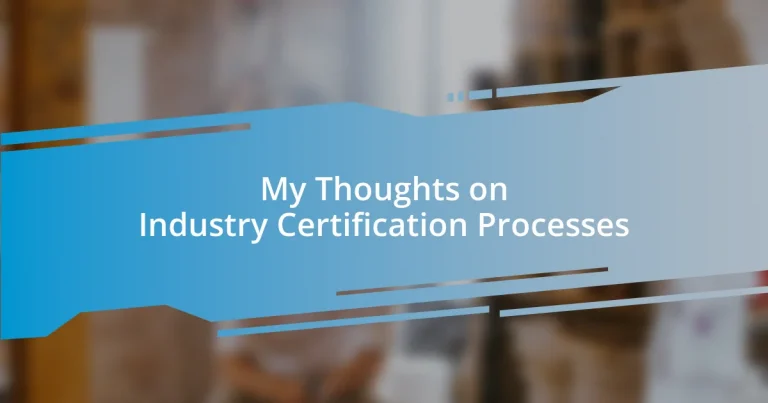Key takeaways:
- Industry certification enhances professional competence and opens doors to job opportunities, showcasing a commitment to ongoing learning.
- A systematic approach to the certification process, including preparation, resource gathering, and community support, is crucial for success.
- Maintaining certification through continuing education and networking enriches professional growth and fosters valuable connections within the industry.
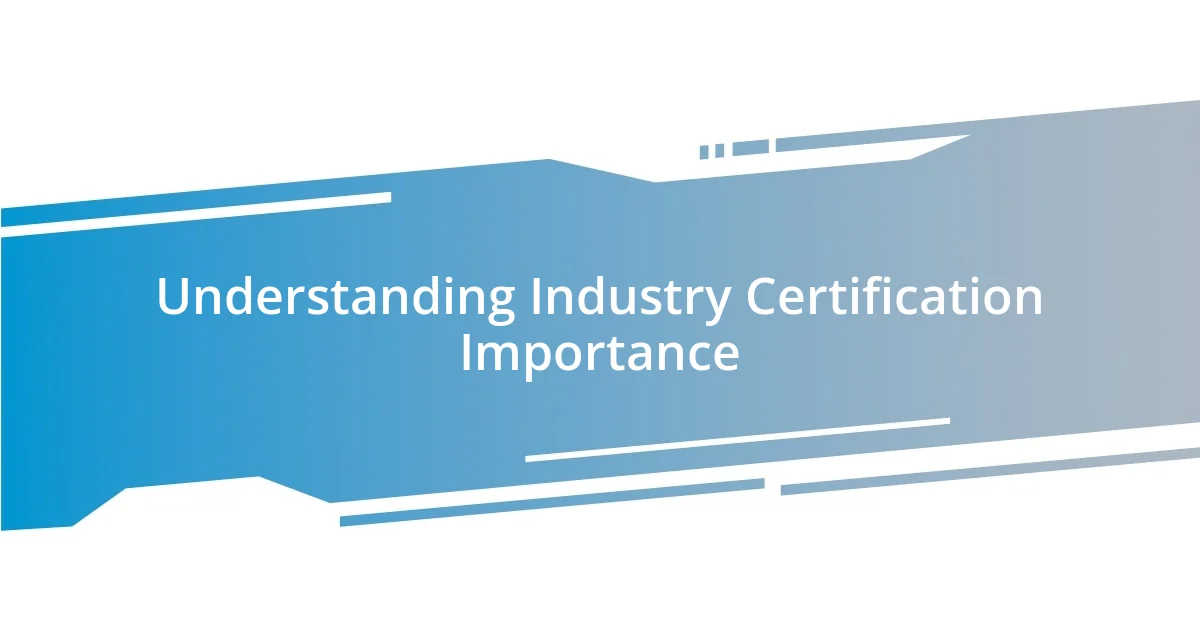
Understanding Industry Certification Importance
Industry certification serves as a powerful signal of professional competence and knowledge. I remember when I first sought a certification in my field—it was both a daunting task and an exhilarating journey. Completing that process not only enhanced my skills but also boosted my confidence, making me feel more validated in my career choices.
When considering the importance of certification, I often ask myself: How does a piece of paper translate to real-world skills and job opportunities? In my experience, it speaks volumes to employers who are sifting through countless resumes. Certification showcases not just theoretical knowledge but also a commitment to ongoing learning and mastery in one’s area of expertise.
Moreover, certifications can open doors that might otherwise remain shut. I’ve seen colleagues land interviews simply because they possessed recognized certifications. It made me realize that in an increasingly competitive job market, having that formal recognition can make all the difference in standing out among candidates.
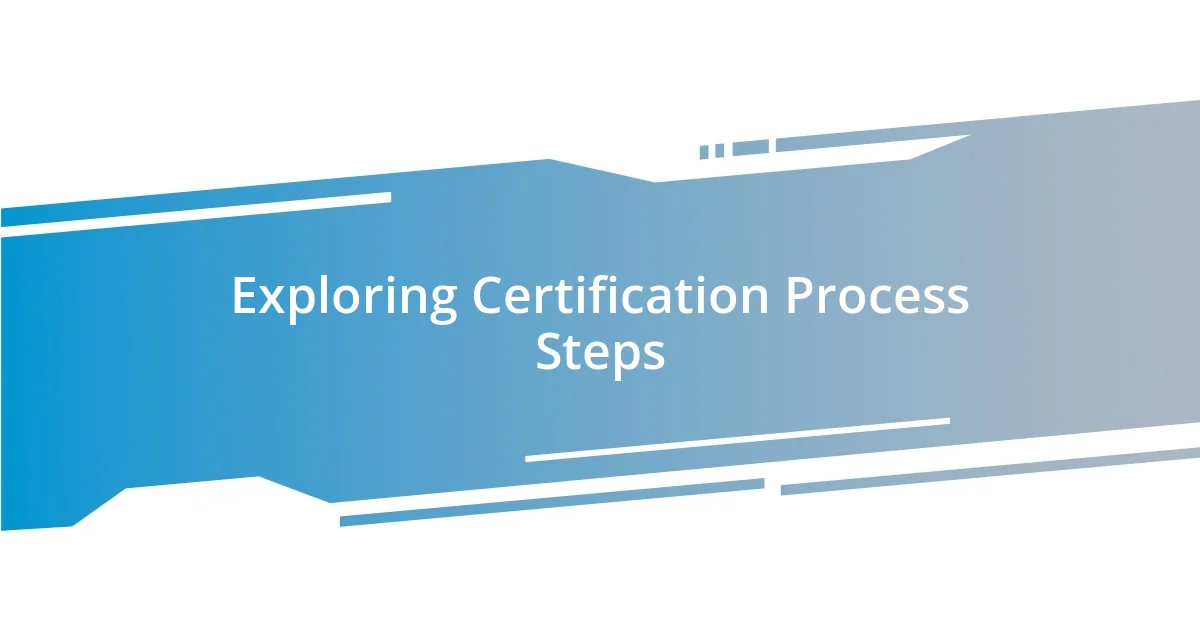
Exploring Certification Process Steps
When I think about the certification process, the first step that comes to mind is preparation. It’s like gearing up for a big race; you want to know the course well and train accordingly. I recall sifting through resources like textbooks, online courses, and study groups, trying to absorb as much relevant information as I could. It wasn’t just about reading; it was about engaging with the material, which made a significant difference in my understanding.
Here’s a breakdown of typical steps involved in the certification process:
- Research the certification requirements: Understand what knowledge and skills are necessary.
- Gather study materials: Compile textbooks, online resources, or enroll in prep courses.
- Create a study plan: Schedule regular study sessions leading up to the exam day.
- Join a study group or find a mentor: Discussing concepts with others can clarify difficult topics.
- Take practice exams: Simulating the test environment can help alleviate anxiety and gauge readiness.
In this journey, I’ve learned that each step requires dedication and focus. The emotional rollercoaster of preparing for an exam can be intense, but each milestone along the way builds not only knowledge but also resilience.
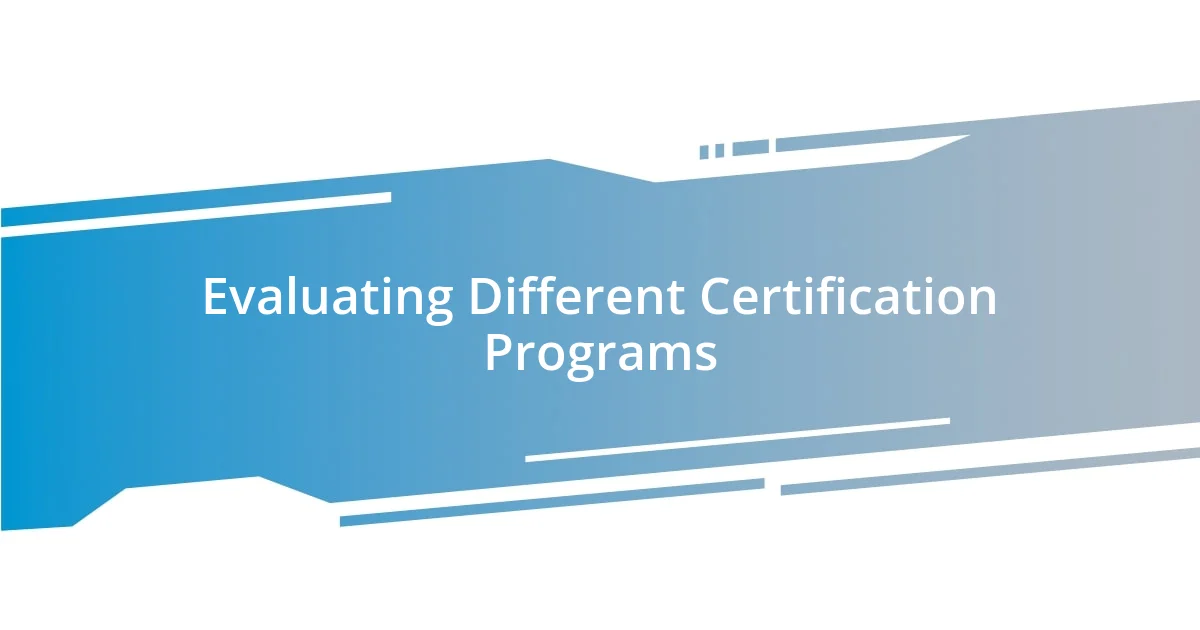
Evaluating Different Certification Programs
When evaluating different certification programs, I always start by considering the credibility of the issuing organization. I remember the first certification I pursued; I was drawn to a well-known institution with a solid reputation. Their materials were top-notch, and the exam felt rigorous, which made me confident that earning that certification would truly reflect my capabilities. In my view, if you’re going to invest time and money, it should be in a program that is widely respected in the industry.
Another crucial factor is the alignment of the certification with my career goals. For instance, when I decided to dive into specialized fields like cybersecurity, I found programs that honed in on specific skills sought by employers in that sector—things like ethical hacking and risk management. This focus made my choice feel relevant and purposeful, driving home the importance of selecting a certification that matches the skills that are not only in demand, but also align with my personal interests.
Lastly, community support is something I deeply appreciate with certification programs. During my journey, connecting with other candidates felt like a lifeline. I recall evenings spent in online forums, where fellow aspirants shared tips and encouragement. It’s comforting to know that you’re not navigating this path alone. A program that fosters a strong community can significantly enhance the learning experience and provide ongoing networking opportunities down the road.
| Certification Program | Credibility |
|---|---|
| Program A | High – Well-known institution |
| Program B | Medium – Established organization |
| Program C | Low – Newer, lesser-known body |
| Career Alignment | Relevance to job market |
| Program A | High – Matches industry demand |
| Program B | Medium – Partially aligned |
| Program C | Low – Not a focus area |
| Community Support | Quality of networking |
| Program A | Strong – Active forums and groups |
| Program B | Moderate – Some support groups |
| Program C | Poor – Lack of interaction |
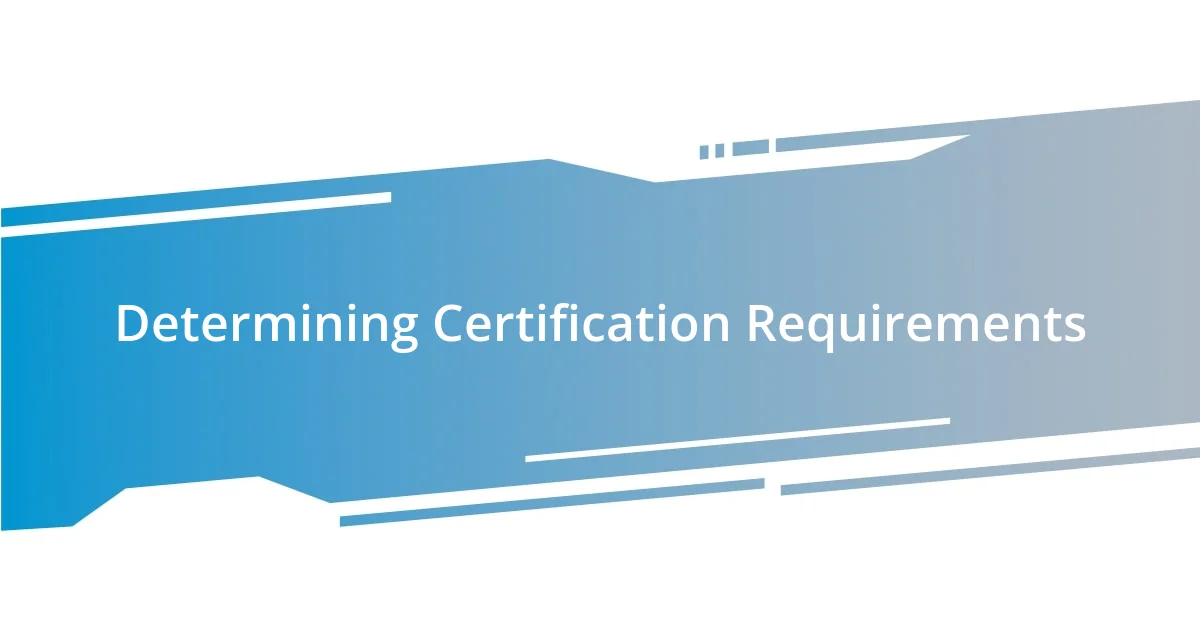
Determining Certification Requirements
Determining certification requirements can feel overwhelming at first, but I’ve found it’s essential to break it down step by step. I remember sitting down with a checklist after my initial excitement and realizing how much information was out there. It’s like looking at a puzzle; I started by identifying the pieces—what specific skills and knowledge I needed for my field. Understanding prerequisites is key; if I had known what was expected from me earlier, I could have streamlined my preparation.
One technique that worked for me was digging deep into the official certification body’s website. They often lay out the details very clearly, sometimes with recommended resources. I once spent an entire evening pouring over FAQs and forums dedicated to my certification track. The questions I found there were just as valuable as the answers. What surprised me was how other candidates articulated their struggles; it reminded me I wasn’t alone. The emotional relief of connecting with others made it easier to navigate what initially seemed like a labyrinth of requirements.
Finally, I discovered the importance of talking to peers in the industry. I remember chatting with a colleague who had just certified in the same area. Their insights were invaluable; they pointed out nuances I hadn’t considered, such as the importance of not just meeting the requirements, but also practicing application of that knowledge in real-life scenarios. It struck me—how often do we focus solely on memorizing facts instead of understanding how to use them? Engaging in discussions with experienced professionals helped me see the bigger picture of what those certification requirements truly meant for my career journey.
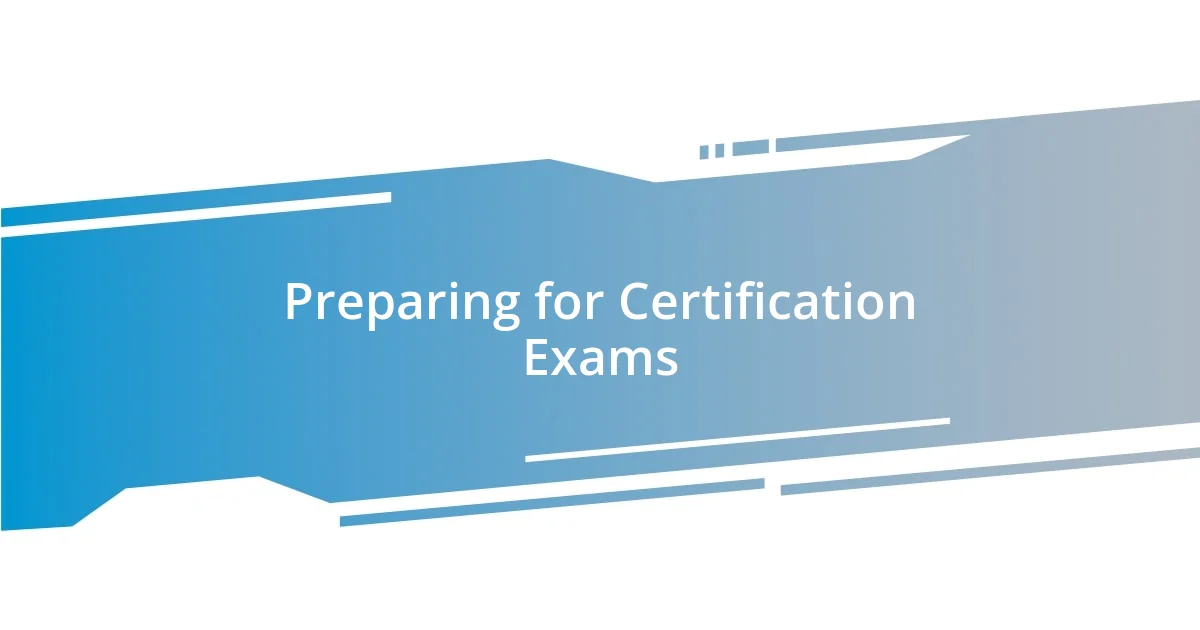
Preparing for Certification Exams
Preparing for certification exams is a journey that often requires a solid strategy and personal investment. I remember the days leading up to my first big exam; I was a bundle of nerves. My approach was simple: I created a study schedule that broke down each topic into manageable parts. This helped me avoid feeling overwhelmed, and I found that checking off completed sections gave me a sense of accomplishment. Have you ever tried to tackle a huge project all at once? It’s exhausting. By pacing myself, I not only retained information better but also infused my daily routine with a sense of achievement.
Practice exams were a game-changer for me. I vividly recall my first attempt at a simulated test; my heart raced as I realized how different it felt from casual studying. It was eye-opening to identify gaps in my knowledge under real exam conditions. I learned that it’s not just about memorizing facts but understanding the application of concepts. I began treating practice tests seriously, viewing them as opportunities to fine-tune my skills rather than just assessments. Do you see value in testing yourself this way? I believe it’s a crucial component of preparation, as it provides insights into the areas that need more focus.
Lastly, I found that joining study groups offered tremendous benefits. Engaging with fellow candidates transformed my perspective. There were moments where I felt frustrated with certain concepts, and in those moments, discussing them with peers opened new doors. I still recall the animated discussions we had, each member bringing their unique insights. It made the content feel less daunting and even fun. Have you experienced the power of collaboration? I can firmly say it fostered a sense of camaraderie that made the preparation process far more enjoyable and effective.
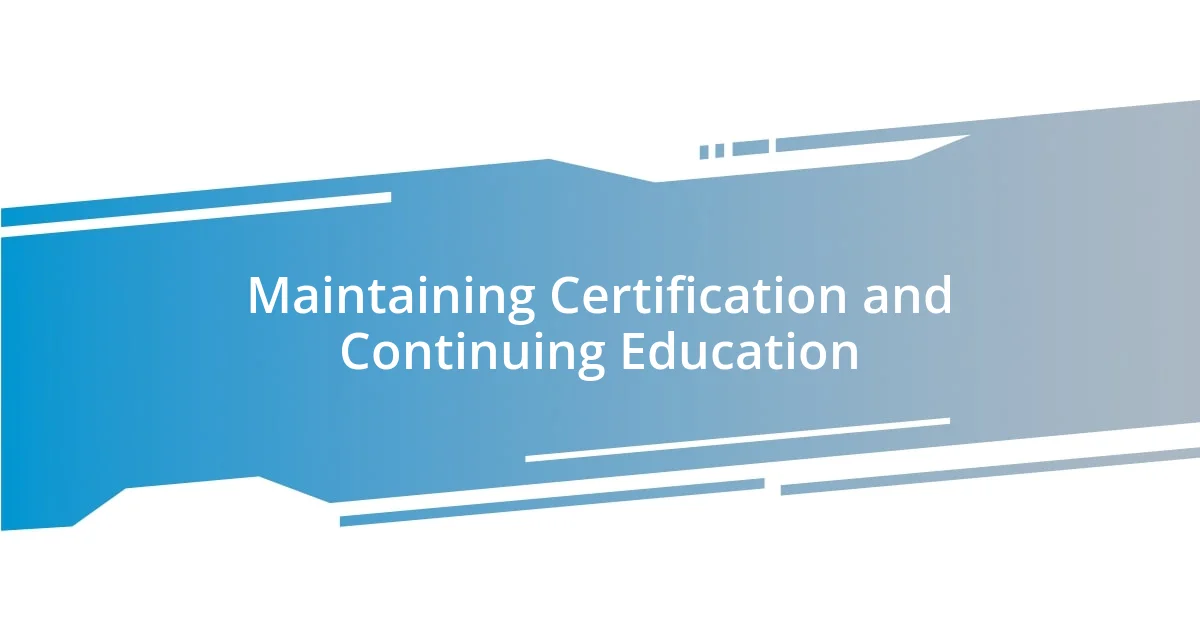
Maintaining Certification and Continuing Education
Maintaining certification isn’t just a checkbox; it requires ongoing commitment and a genuine interest in professional growth. I remember the moment my certification renewal approached, and I felt a mix of anxiety and motivation. The credits I needed seemed daunting at first, but I began to see it as an opportunity to explore new facets of my field. Have you ever had that moment where a challenge turns into a chance for growth? I certainly did, and it changed my perspective on continuing education.
Engaging in continuing education can be incredibly fulfilling. For instance, I took an online course last year that not only fulfilled my requirements but reignited my passion for learning. I found myself excited to dive into new topics that I hadn’t considered before, like emerging technologies and industry trends. It was like being back in school, but this time, the knowledge felt more relevant and applicable. Have you ever pursued something simply out of curiosity? Sometimes that spark of interest can lead to the most rewarding experiences.
Networking also plays an essential role in maintaining certification. I often attend local workshops, not just as a means to earn those credits but also to connect with fellow professionals. There’s something invigorating about sharing ideas and challenges with others in the same boat. I remember leaving a recent workshop, feeling inspired by conversations that opened my eyes to new possibilities. Have you experienced the camaraderie of a community pursuing similar goals? Engaging with peers can be a powerful motivator that enhances our journey in maintaining our credentials.
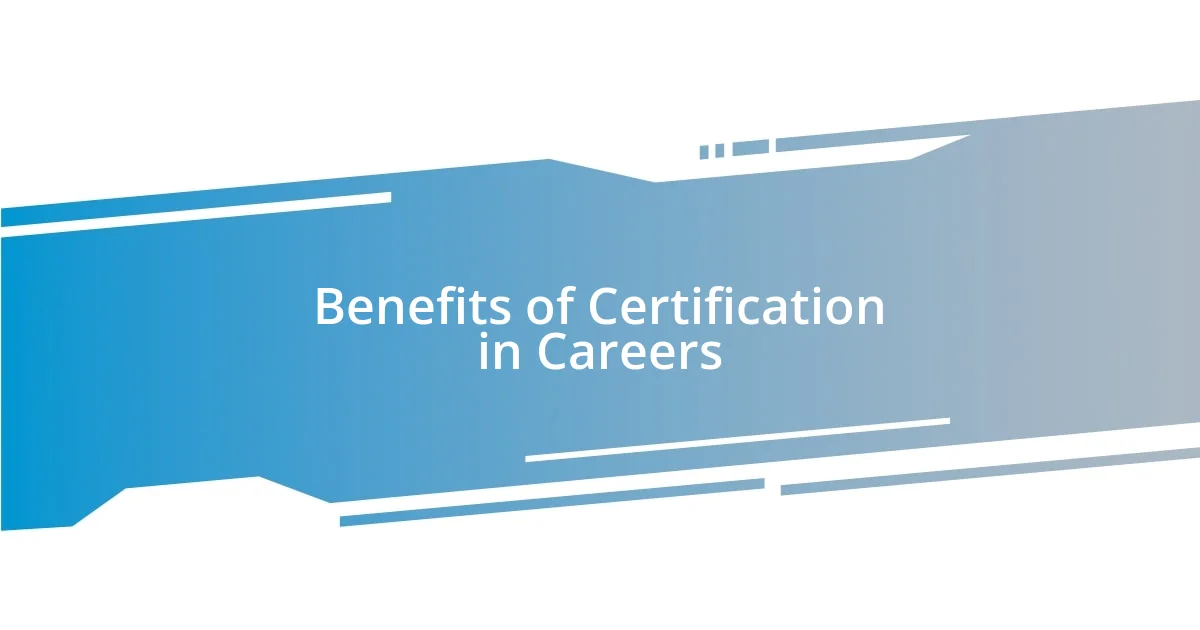
Benefits of Certification in Careers
Certification carries numerous benefits that can significantly influence one’s career trajectory. I’ve seen firsthand how obtaining relevant certifications not only boosted my confidence but also enhanced my resume. It’s astonishing to think that just a small piece of paper can open doors to new opportunities! Have you ever contemplated how a certification might alter your career path? For me, certifications have positioned me as a credible expert and even led to some exciting promotions.
One notable advantage of certification is the specialized knowledge it brings. I remember when I earned a project management certification; the skills I gained allowed me to tackle complex projects with newfound efficiency. This wasn’t just about checking a box; it transformed how I approach tasks and collaborate with teams. Have you ever experienced a shift in perspective because of something you learned? For me, that transformation led to significant achievements and recognition within my organization.
Furthermore, certifications can enhance professional networking. I still recall attending a conference where I met industry leaders who were equally passionate about certified practices. We bonded over shared experiences and exchanged ideas that enriched my understanding of the field. Isn’t it incredible how a shared commitment to certification can create such strong connections? Those relationships have been invaluable, proving that the benefits of certification extend far beyond personal gain; they foster a community of motivated professionals ready to support one another.












